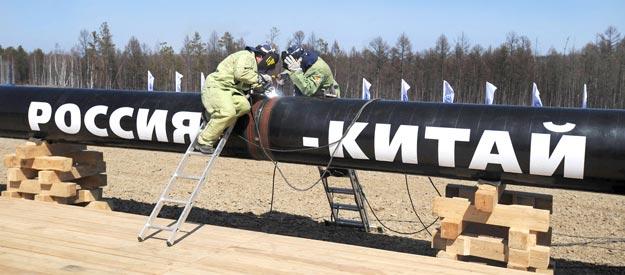
GAS: IMPORTANT DEAL

Chinese President Xi Jinping finally granted his Russian counterpart a long-awaited gas supply contract on Wednesday, ending a decade of negotiations during which China's economic growth tilted the bilateral balance of power in Beijing's favour.
Under the terms of the $400bn agreement, Gazprom will supply China National Petroleum Corp with 38bn cubic metres of natural gas over a 30-year period. For Vladimir Putin, the deal offers an opportunity to reduce Russia's reliance on European customers, aggrieved by Moscow's annexation of Crimea and destabilisation of eastern Ukraine.
"At least symbolically, [the Russians] have shown that they can find enough common ground with China to send this powerful signal," said Fyodor Lukyanov, chairman of the Council on Foreign and Defence Policy, a Moscow think-tank. "China did not overly exploit the current situation to its own advantage."
Mr Putin witnessed the signing ceremony just hours before he was due to fly out of Shanghai. By that point he had participated in almost two days of pomp and circumstance, including the launch of joint military exercises.
"Those exercises tell you that nothing is keeping us from moving towards a real alliance," said a Russian government official familiar with Moscow's Asia policy. "And that Russia, fully drifting towards China, is the only argument left which could convince America to start engaging Russia again, because Washington doesn't want that."
For China, however, the deal is likely to have far less geopolitical significance despite its desire to diversify its supplies of oil and gas.
Some Chinese analysts saw the deal primarily as a sign of Moscow's need for Beijing's support.
"Putin knows his limits," said Wang Yiwei, an expert on Sino-European relations at Renmin University in Beijing. "Russia is not the Soviet Union. It is not an empire."
Beijing remains very much aware that bilateral trade with the US is three times greater than its trade flows with Russia.
"China still wants to build a major power relationship with the US," Mr Wang added. "China's interdependence with the world, especially the west, is much higher than Russia's. We are more concerned about our relations with the west. We are benefiting from globalisation." Russia joined the World Trade Organisation only in 2012, more than a decade after China did.
Crucial pricing details of the gas deal were not revealed by either party and financing arrangements have not yet been agreed for the pipelines and other required infrastructure that must be built. Gas will not begin to flow until 2018 at the earliest and the volume envisaged is equivalent to just 16 per cent of Gazprom's current exports.
"Putin is saying if you don't want me I'll turn east but he can't," one industry executive said. "If you look at the landscape all of the pipelines go west. They will need vast investment to go east. And the fields that are closer to China are not very rich."
Negotiations on the gas agreement began a decade ago between Mr Putin, then in his first term as president, and Mr Xi's predecessor, Hu Jintao.
The subsequent talks have been complicated by China's strict price control regime, which pegged domestic prices below international levels. As a result, CNPC was losing money on every cubic metre of gas it imported.
While the government did adjust prices upwards last year, the shock was too much for some end-users.
"The whole reason [for the adjustment] was to give CNPC the opportunity to finally make money on gas deals," the industry executive said. "All of a sudden the economics of industrial projects that used to be feasible were thrown completely out the window."
Accepting a high price from Gazprom would only make matters worse for both CNPC and its customers, prompting Beijing to drag out the negotiations as the US shale gas boom strengthened its negotiating position by depressing international market prices.
Conversely, however, financing costs for the infrastructure needed to extract and transport Siberian gas to China have been rising.
Such practical considerations ultimately weighed more heavily on Mr Xi than Mr Putin's usefulness as a counterweight to the west, leading the Chinese government to drive a very hard bargain during the negotiations.
The crisis in the Ukraine has also tested Beijing's patience with its northern neighbour. While China has been careful not to criticise Moscow's annexation of Crimea and its largely pro-Russian population, Cheng Xiaohe at Renmin University says the move cast doubt on the "credibility" of China's traditional insistence that no country should interfere in another's internal affairs.
In addition, it raised an unsettling precedent for some of China's own restive regions such as Xinjiang, where attacks by Muslim Uighur separatists have become an almost weekly phenomenon, and Tibet.
"China has its own problems," Mr Cheng said. "We have terrorism in Xinjiang but also Tibet is an issue and Taiwan remains beyond the control of the Chinese government. So when you take all the factors into consideration it's hard to say China was a big beneficiary [of the Ukraine crisis]."
ft.com





